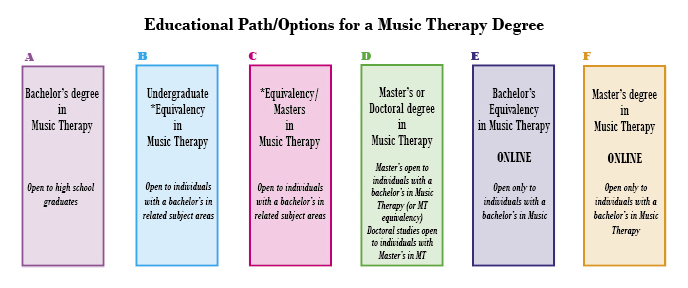The Education of a Music Therapist
The education of a music therapist is unique among college degree programs because it not only allows a thorough study of music, but encourages examination of one's self as well as others. Students may begin their study on the undergraduate or graduate level. The entry-level curriculum includes clinical coursework and extended internship requirements in an approved mental health, special education, or health care facility. Upon successfully completing academic and clinical training, and subsequently passing the national examination administered by the independent Certification Board for Music Therapists, the graduate acquires the credential, Music Therapist-Board Certified (MT-BC).
The approved curriculum is designed to impart entry level competencies in three main areas: Musical Foundations, Clinical Foundations, and Music Therapy Foundations and principles as specified in the AMTA Professional Competencies. Entry level study includes practical application of music therapy procedures and techniques learned in the classroom through required fieldwork in facilities serving individuals with disabilities in the community and/or on-campus clinics. Students learn to assess the needs of clients, develop and implement treatment plans, and evaluate and document clinical changes.
Individuals who have a baccalaureate degree may elect to complete the degree equivalency program in music therapy offered by most AMTA-approved universities. Under this program, the student completes only the coursework necessary for equivalent music therapy training without necessarily earning a second baccalaureate degree. Some schools may require that the student's initial degree be in music.
Graduate programs in music therapy examine, with greater breadth and depth, issues relevant to the clinical, professional, and academic preparation of music therapists, usually in combination with established methods of research inquiry. Selected universities offer doctoral study in music therapy, some of which include coursework in music therapy in combination with doctoral study in related areas.
The Career in Music Therapy Brochure: View, download or print a list of Schools offering degrees in music therapy.
The Non-discrimination and Equal Opportunity Policy outlines AMTA's commitment to non-discrimination and the promotion of equal opportunity, fairness, justice, and respect for all persons. Prospective students should carefully consider and review the policies, codes, missions, and philosophies of the programs and institutions for which they plan to apply.

IF:
- you are a high school graduate, then you may be eligible for option A
- you have a Bachelor’s in a related subject (Education, Psychology, etc.) then you may be eligible for option A or B
*Subject to approval by the Program Director, individuals who have earned a baccalaureate degree in an area other than music therapy may elect to complete the equivalency program in music therapy offered by most AMTA-approved universities. Under this program, the student completes only the required coursework necessary to satisfy professional competencies in music therapy without necessarily earning a second baccalaureate degree. Individuals who have a bachelor’s degree specifically in music are also eligible to pursue a Master’s degree in Music Therapy (C) offered by AMTA-approved degree programs, by first completing the required undergraduate music therapy coursework including the internship, (essentially the Music Therapy equivalency described above) then moving onto the master’s coursework.
-you have a Bachelor’s in Music, then you may be eligible for option B, C or E (online)
-you have a Bachelor’s in Music Therapy and are seeking a graduate degree, then you may be eligible for option D or F (online)
-you have a wealth of music experience and/or strong musicianship (but no degree in music), then you are eligible for option A (Subject to approval by the Program Director, certain coursework may be waived--please discuss your specific situation with the school Program Director)
For more detailed information or questions contact info@musictherapy.org
For a list of AMTA-approved schools offering a music therapy degree, go to the menu item, Education & Careers>Schools Offering Music Therapy and follow the instructions to search for an AMTA-approved school.
8455 Colesville Road, Suite 1000 | Silver Spring MD 20910 | Phone: 301.589.3300 | Fax: 301.589.5175